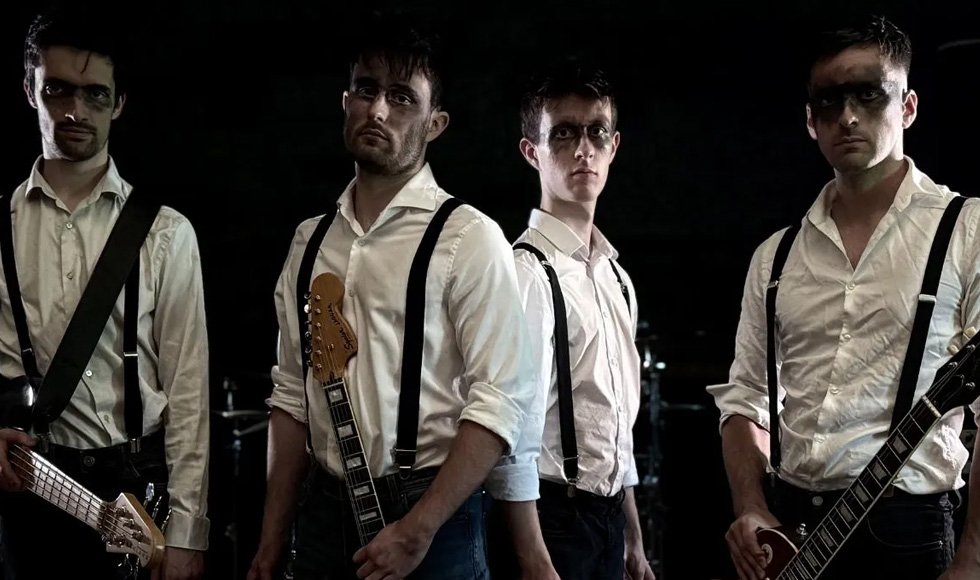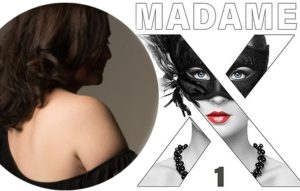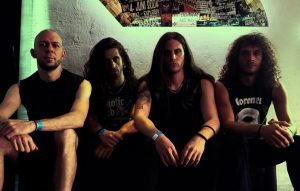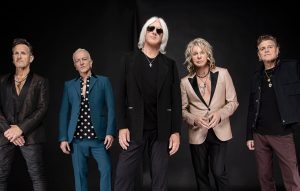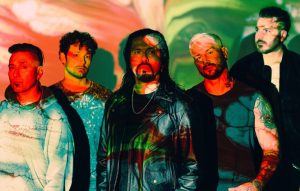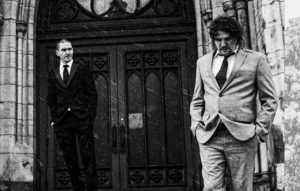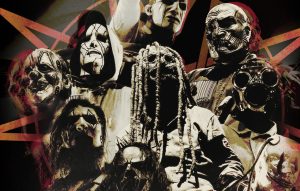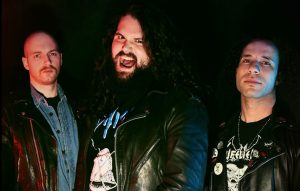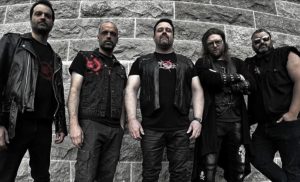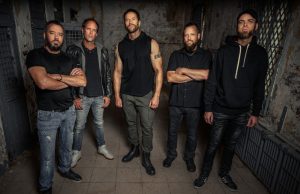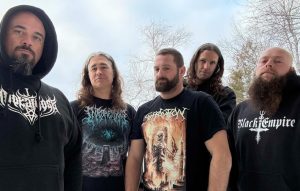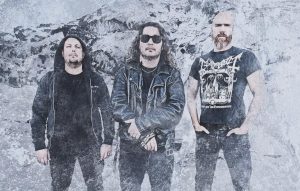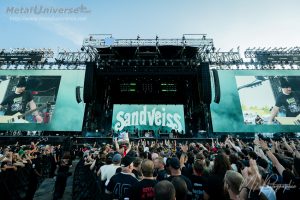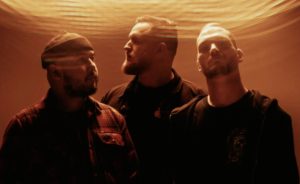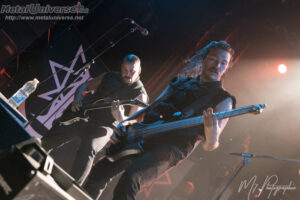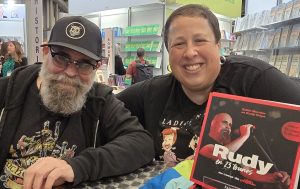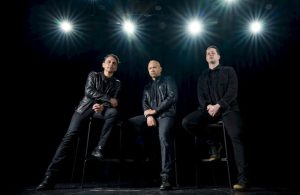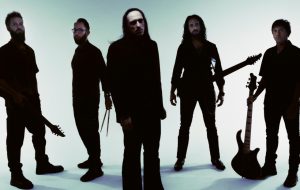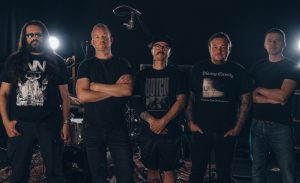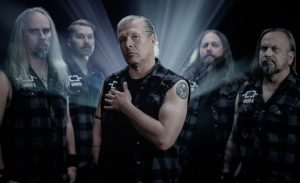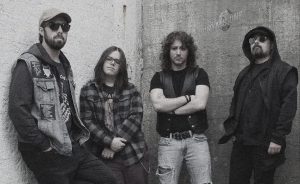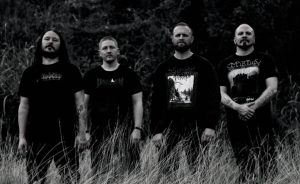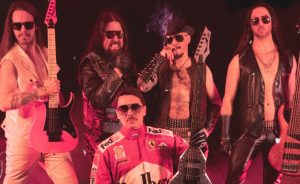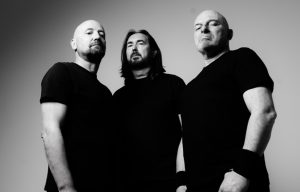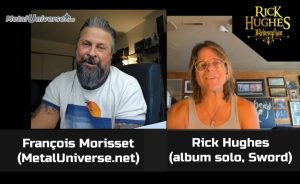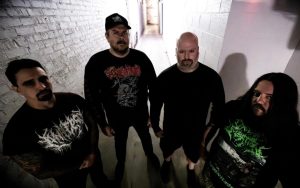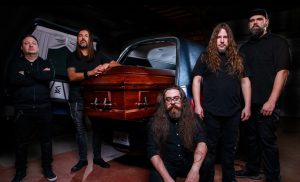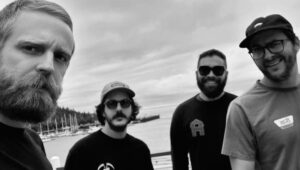
[Propriétaire MU Média – MetalUniverse.net]
Entrevue avec MÜ pour MetalUniverse.net, Québec
Le groupe nantais MÜ trace sa route avec une identité singulière, fusionnant rock français, death metal et post-prog. Après un premier album paru en 2022 et avec un nouvel EP prévu pour la rentrée 2025, la formation revient avec une énergie renouvelée, une écriture majoritairement en français et une volonté d’explorer sans compromis les émotions entre effondrement et espoir. Notre journaliste Marc Desgagné de MetalUniverse.net a réalisé une entrevue avec le groupe pour en savoir plus sur leur évolution, leurs inspirations et leurs ambitions futures.
[ english follows ]
MU: Tout d’abord, merci de prendre le temps de répondre à nos questions ! Pour commencer, pourriez-vous présenter brièvement MÜ à nos lecteurs et lectrices et nous dire d’où vous venez et d’où vient l’idée derrière le nom ?
MÜ: Bonjour ! MÜ c’est un groupe de post prog nantais fondé en 2020, c’est à la base un groupe de lycéennes et lycéens dont le line-up a beaucoup changé au cours de son évolution ! Le style lui aussi a beaucoup évolué pour en arriver à la formule actuelle, qu’on qualifie de post prog.
Pour le nom ça vient de plusieurs choses : d’abord on s’appelait MUTE, on trouvait ça bien mais au final il y avait déjà un groupe à notre connaissance qui s’appelait comme ça. Du coup on a enlevé le TE, MÜ c’est plus court et plus facile à retenir. De plus ça fait écho au “continent perdu de Mu”. On trouve l’image d’un continent englouti belle et vertigineuse, ça peut aussi faire des liens avec des thèmes récurrents dans nos morceaux (l’imaginaire, la place de l’enfance, voire des thématiques plus dures comme l’effondrement ou des choses plus introspectives).
MU: Après un premier album en 2022 et avec un EP prévu pour la rentrée 2025, comment décririez-vous l’évolution musicale de MÜ entre ces deux étapes ?
MÜ: Le premier album de 2022 était déjà vieux pour nous au moment de sa sortie. Les morceaux ont été composés alors qu’on était au lycée, puis le covid a grandement ralenti le processus. À ça il a fallu rajouter que c’était notre première “grosse” sortie, donc on a fait beaucoup d’erreurs et on apprenait tout sur le tas. Ça donne une bonne première expérience et des souvenirs sympas, mais on a tellement évolué en tant que musiciens depuis la composition des premiers morceaux qu’on ne s’y retrouve plus vraiment.
Entre temps on s’est beaucoup éloigné du blues rock et on a trouvé de l’inspiration dans des styles comme le death metal, le post rock, le jazz, etc. Tout en essayant de rester créatifs et sans perdre l’envie d’écrire majoritairement en français !
MU: Composer en français dans un univers où l’anglais domine souvent le rock et le metal peut représenter un défi. Qu’est-ce que vous trouvez le plus difficile dans cet exercice, et pourquoi ?
MÜ: C’est clair que c’est un peu se mettre des bâtons dans les roues. Souvent les gens accrochent moins au français dans le rock/métal. Ça vient sûrement du fait que la chanson française est vue comme un truc de vieux, et peut-être que quand on dit qu’on chante en français, les gens pensent inconsciemment à Michel Sardou ou Jean-Jacques Goldman. Forcément, ça ne donne pas envie aux jeunes, et on les comprend.
Plus sérieusement, il existe une sorte de malaise autour du fait de chanter en français, probablement une forme de pudeur. Mais on pense qu’en portant un message sincère et en voulant transmettre des émotions, on peut arriver à quelque chose qui parle autant aux jeunes qu’aux plus âgés.
Le plus difficile, c’est de trouver un juste milieu : réussir à faire passer un message de manière poétique ou esthétique sans tomber dans le cliché du poète maudit du 19e siècle, ni dans le côté simpliste de la pop. Et le tout, sans jamais perdre la sincérité.
MU: À l’inverse, à quel point est-ce important pour vous de conserver le français dans vos textes ? Est-ce que certains artistes ou auteurs vous inspirent en particulier à ce niveau ?
MÜ: Pour nous, c’est important. C’est notre langue et on a des choses à dire. On écrit en français pour que les francophones puissent comprendre ce qu’on chante. Nos textes peuvent paraître sibyllins parfois, mais c’est parce qu’on ne prend pas les gens pour des idiots. Et s’ils ne comprennent pas exactement notre intention, on veut qu’ils se les approprient et les interprètent.
Au final, écrire en français est presque un positionnement politique. Cela dit, on fait aussi des morceaux en anglais, et si on parlait une troisième langue, on l’utiliserait aussi.
MU: Quelles sont vos principales influences musicales, et qu’est-ce qui vous inspire le plus au moment d’écrire ? Est-ce que vous avez une idée précise en tête ?
MÜ: Niveau influences, c’est très large. Pour l’instrumental : Gojira, Converge, Loathe pour la lourdeur et la frénésie, Russian Circles pour le côté planant, Polyphia pour la créativité instrumentale. Pour les textes, Damien Saez est une grande inspiration, mais aussi Feu! Chatterton, Luke, Soan.
Le processus d’écriture, lui, est complètement aléatoire : parfois les textes précèdent la musique, parfois l’inverse, parfois les deux viennent ensemble. Beaucoup d’idées finissent dans un dossier “maquettes” pendant des années… mais c’est normal, ça fait partie du processus.
MU: On reconnaît dans certaines chansons, comme Le Vertige, une pesanteur dans les guitares et une intensité vocale marquée. Comment arrivez-vous à équilibrer ce poids sonore avec vos émotions et votre message ?
MÜ: C’est assez simple : je crie quand ce que je dis mérite d’être crié. L’interprétation vocale est directement liée à l’intensité du message.
MU: Le début de la chanson en anglais Fate and Ashes, la seule de l’EP, propose un rythme très rapide qui flirte presque avec le punk/hardcore. Qu’est-ce qu’elle représente pour vous ?
MÜ: Elle représente notre envie de donner de l’énergie en concert. C’est le morceau qui ouvre notre set live, il est pensé pour ça.
MU: Pourquoi avoir choisi de réaliser une vidéo live session pour La Voix des Fous, et comment s’est déroulé l’enregistrement ?
MÜ: On aimait particulièrement ce morceau, à la fois pour l’instrumental et pour le texte. Mais l’enregistrement a été une vraie galère : les lumières faisaient buzzer les guitares, on a dû s’adapter. Heureusement, on a travaillé avec une équipe vidéo très compétente.
MU: Que pouvez-vous nous dire à propos des thèmes des chansons À la merci d’une étoile et La rive ?
MÜ: À la merci d’une étoile explore des réflexions existentielles : la tristesse est-elle inscrite dans la nature humaine ou exacerbée par notre époque ? La rive parle davantage de la gestion des émotions, de la colère et de la volonté de changer, avec une note plus positive.
MU: Pour Soleil Noir, on ressent toute la lourdeur dès les premières notes. Quelles émotions vous viennent en tête pour ce titre ?
MÜ: À l’origine, ça devait être une outro instrumentale. Finalement, j’ai ajouté un texte écrit pour un autre morceau et je l’ai fait lire par une amie, Margaux, pour sa voix. J’espère que les auditeurs ressentiront de l’empathie pour les personnages et de la colère face à la violence décrite.
MU: Votre musique se situe entre rock français, death metal et métal progressif. Comment parvenez-vous à fusionner ces styles sans perdre l’identité de MÜ ?
MÜ: Ça se fait instinctivement. Je compose ce que j’aimerais entendre, et comme j’aime beaucoup de styles, ça ressort naturellement. Ensuite, chaque membre remanie ses parties, ce qui crée notre identité éclectique.
MU: En tant que groupe rock français, comment percevez-vous la relation avec les médias traditionnels ?
MÜ: La fracture est surtout entre les médias mainstream et indépendants. Les radios indépendantes proposent des alternatives intéressantes. Mais pour un groupe émergent comme nous, les nouveaux médias restent plus accessibles.
MU: Vous avez choisi de sortir un EP plutôt qu’un album complet pour cette nouvelle étape. Qu’est-ce qui a motivé cette décision ?
MÜ: Cet EP marque une transition forte. On voulait évoluer en douceur. L’album complet est prévu pour l’été 2026.
MU: Avez-vous déjà une idée précise de vos plans pour ce second album ?
MÜ: Les morceaux existent déjà, mais on attend de voir l’accueil de l’EP avant de travailler l’enregistrement et la tracklist.
MU: Votre univers parle autant d’effondrement que d’espoir. Comment maintenez-vous cet équilibre ?
MÜ: Naturellement, je ne parle pas beaucoup d’espoir. Mais en y réfléchissant, c’est important de se forcer à en inclure. Sinon, pourquoi écrire des morceaux sur l’effondrement ?
MU: Sur scène, votre énergie est décrite comme débordante. Quels souvenirs souhaitez-vous laisser aux fans ?
MÜ: On veut que l’énergie de nos concerts montre qu’il reste toujours un peu d’espoir. Et si les gens prennent la peine de venir nous voir, on doit tout donner.
MU: Si MÜ devait composer une chanson inspirée d’un film ou d’un roman, lequel choisiriez-vous et pourquoi ?
MÜ: Le Petit Prince, parce qu’on s’en inspire déjà pas mal.
MU: Merci encore pour votre temps ! Avez-vous un dernier mot pour nos lecteurs et lectrices ?
MÜ: Oui, suivez-nous sur Instagram (@mu_groupe) pour être au courant de nos tournées. Pour le Québec, il faudra attendre encore un peu… mais ça viendra !
Pour suivre MÜ:
Tous les liens et écoute: https://linktr.ee/mu_groupe
Facebook: https://www.facebook.com/MuNantesOff
Instagram: https://www.instagram.com/mu_groupe/
Bandcamp: https://mu-groupe.bandcamp.com/music
ENGLISH version
Interview with MÜ for MetalUniverse.net, Quebec
The Nantes-based band MÜ has been carving its own path with a distinctive identity, fusing French rock, death metal, and post-prog. After a first album released in 2022 and with a new EP scheduled for fall 2025, the band is back with renewed energy, a choice to write mostly in French, and a determination to explore emotions without compromise, moving between collapse and hope. Our journalist from MetalUniverse.net sat down with them to learn more about their evolution, inspirations, and future ambitions.
MU: First of all, thank you for taking the time to answer our questions! To start, could you briefly introduce MÜ to our readers and tell us where you come from and the idea behind the name?
MÜ: Hello! MÜ is a post-prog band from Nantes, founded in 2020. It started as a high school band whose lineup has changed a lot throughout its evolution! The style has also changed quite a bit, leading to what we now call post-prog.
As for the name, it came from a few things: we were originally called MUTE, which we liked, but we found out there was already another band with that name. So we dropped the TE, and MÜ was shorter and easier to remember. It also echoes the “lost continent of Mu.” We found the image of a sunken continent beautiful and vertiginous, and it ties in with recurring themes in our songs—imagination, childhood, or more difficult topics like collapse or introspection.
MU: After a first album in 2022 and with an EP planned for fall 2025, how would you describe the musical evolution of MÜ between these two steps?
MÜ: By the time our first album came out in 2022, the songs already felt old to us. They were written back in high school, and COVID really slowed the whole process down. Plus, it was our first big release, so we made a lot of mistakes and were learning everything as we went along. In the end, it gave us a good first experience and some nice memories, but we’ve evolved so much as musicians since writing those songs that we don’t really identify with them anymore.
Since then, we’ve moved away from blues rock and found inspiration in genres like death metal, post-rock, jazz, and more—all while trying to stay creative and not lose the drive to write mostly in French!
MU: Writing in French in a scene where English often dominates rock and metal can be a challenge. What do you find the most difficult about this, and why?
MÜ: It’s true that it’s like shooting yourself in the foot, because people often connect less with French in rock/metal. That probably comes from the fact that French song is seen as something old-fashioned, and maybe when people hear “we sing in French,” they immediately think of Michel Sardou or Jean-Jacques Goldman. Obviously, that doesn’t appeal much to younger audiences, and we get that.
More seriously, there’s a certain discomfort around singing in French, maybe a kind of modesty. But we think that by being sincere and trying to convey emotions, it can reach both young listeners and older ones.
The hardest part is finding the balance between writing lyrics that are poetic or aesthetically pleasing without sounding like a 19th-century “cursed poet,” or on the flip side, like a pop singer dumbing things down. And all of that without losing sincerity and meaning.
MU: On the other hand, how important is it for you to keep French in your lyrics? Are there artists or writers that particularly inspire you in this regard?
MÜ: For us, it’s important. It’s our language, and we have things to say. We want francophone listeners to understand what we’re singing. Our lyrics can sometimes be cryptic, but that’s because we don’t take people for idiots. If they don’t get exactly what we meant, that’s fine—we want them to interpret it and find a meaning that speaks personally to them.
In the end, writing in French is almost a political stance. That said, we also write in English, and if we spoke a third language, we’d use it too. French isn’t “better” than another language—it’s just ours.
MU: What are your main musical influences, and what inspires you the most when writing? Do you usually have a clear idea in mind?
MÜ: Our influences are very broad. For the instrumentals, bands like Gojira, Converge, or Loathe inspire us for heaviness and frenzy. Russian Circles inspire the more atmospheric side, and Polyphia pushes us to be creative with our instruments. For the lyrics, Damien Saez is a big influence, as well as Feu! Chatterton, Luke, and Soan.
As for writing, it’s random. Sometimes I jot down ideas and never use them. Sometimes I fit lyrics to music, or write both at the same time from one concept. Most of the time, ideas pile up in a “demos” folder for years… but that’s part of the process.
MU: In some songs, like Le Vertige, we hear a heaviness in the guitars and strong vocal intensity. How do you balance that weight with your emotions and your message?
MÜ: It’s not complicated: I scream when what I’m saying feels like it deserves to be screamed. The vocal performance is tied to the emotional intensity of the message, and the same goes for the energy of the guitars.
MU: The beginning of Fate and Ashes, the only English song on the EP, is very fast and almost flirts with punk/hardcore. What does it represent for you?
MÜ: It’s about giving energy live. It’s the song that opens our set after the intro. Since its meaning is particularly violent, we wanted to lean into that punk/hardcore vibe so that lyrics, performance, and instrumentals all aligned.
MU: Why did you choose to make a live session video for La Voix des Fous, and how was the recording process?
MÜ: We chose it because we really like that song—it covers a wide range instrumentally and lyrically. Recording it, though, was tough. The lighting setup caused buzzing in all the guitars, so we had to adapt. Luckily, we worked with a great video team who made it happen.
MU: Can you tell us more about the themes of À la merci d’une étoile and La rive?
MÜ: À la merci d’une étoile asks if humans have always been predisposed to sadness and despair, or if it’s our times and environment that amplify those feelings. La rive is more personal—it’s about handling emotions like anger, the will to change, and the positive effects of that change.
MU: In Soleil Noir, we feel heaviness from the very first notes. It builds slowly before erupting. What emotions come to mind with this track?
MÜ: It was originally just supposed to be an instrumental outro. But as I was mixing the EP, I had a text that I decided to overlay on the blast beats. Then I had a friend, Margaux, read it, because I liked her voice. I hope listeners feel empathy for the characters and anger at the violence described.
MU: Your music blends French rock, death metal, and progressive metal. How do you fuse those styles without losing MÜ’s identity?
MÜ: Instinctively. I write the music I want to hear, and since I enjoy many different styles, that comes out naturally. Then the other members rework their parts, which creates a concentrated mix of influences.
MU: As a French rock band, how do you see your relationship with traditional media? Do you feel there’s a lack of openness?
MÜ: The real divide is between mainstream media and independent media, not so much old vs. new. Independent radio, for example, tries to provide an alternative. Of course, as an emerging band, new media is more accessible for us, but I don’t think it’s impossible to reach traditional media either.
MU: You chose to release an EP instead of a full album for this new step. What motivated that decision?
MÜ: This EP marks a strong transition from what we were doing before, so we wanted to take it slowly. We already have enough songs for an album, but we want to see how the EP and our first tour go first. The album should arrive in summer 2026.
MU: Do you already have plans for that album, or are you waiting to see how the EP shapes things?
MÜ: Like I said, the songs are there, but we’ll wait to see the EP’s reception before picking the tracklist and recording.
MU: Your universe deals with collapse but also with hope. How do you keep that balance?
MÜ: Honestly, I don’t talk much about hope naturally. But it’s important to make the effort, because if there was no point in the future, we wouldn’t bother writing songs about collapse.
MU: On stage, your energy is often described as overflowing. What kind of memory do you want to leave with the audience after a show?
MÜ: For us, the energy in live shows is proof that there’s still hope. If someone paid for a ticket and came out to give us a chance, we owe them our all.
MU: If MÜ had to compose a song inspired by a book or a movie, which would it be and why?
MÜ: The simplest answer is The Little Prince by Saint-Exupéry, because it already inspires us a lot.
MU: Thanks again for your time! Do you have a final message for our readers?
MÜ: Yes—follow us on Instagram (@mu_groupe) to see if we’re touring near you. For Quebec, you’ll have to wait a bit longer… but it will come!
